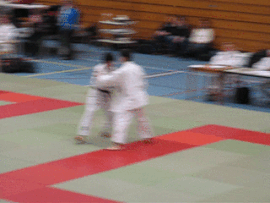TAEKWONDO
Is a martial art that in "todays" form of self defense has evolved by combining many different styles of martial arts that existed in Korea over the last 2,000 years and some martial arts styles from countries that surround Korea. Taekwondo incorporates the abrupt linear movements of Karate and the flowing, circular patterns of Kung-fu with native kicking techniques. Over fifty typically Chinese circular hand movements can be identified in modern Taekwondo. A few of the earlier martial arts styles that contributed to Taekwondo are: T'ang-su, Taek Kyon, also known as Subak, Tae Kwon, Kwonpup and Tae Kwonpup. There are also influences from Judo, Karate, and Kung-fu.
The greatest turning point for Korean martial arts started in 1952. During the height of the Korean War, President Syngman Rhee watched a 30 minute performance by Korean martial arts masters. He was especially impressed when Tae Hi Nam broke 13 roof tiles with a single punch. After the demonstration Rhee talked with Hong Hi Choi about the martial arts, he then ordered his military chiefs of staff to require all Korean soldiers to receive training in the martial arts. This caused a tremendous surge in Taek Kyon schools and students. President Rhee also sent Tae Hi Nam to Ft. Benning, Georgia for radio communications training. While there, Tae Hi Nam gave many martial arts demonstrations and received considerable media publicity.
A Taekwondo demonstration at the United Nations headquarters in New York City in 1963, caused the formation of the U.S. Taekwondo Association in 1967, which later was superseded in 1974 by the U.S. Taekwondo Federation.
Today, The original Five Codes of Human Conduct have been correlated into the so-called Eleven Commandments of modern day Taekwondo, which are:
| Loyalty to your country | Respect your parents |
| Faithfulness to your spouse | Loyalty to your friends |
| Respect your brothers and sisters | Respect your elders |
| Respect your teachers | Never take life unjustly |
| Indomitable spirit | Loyalty to your school |
| Finish what you begin |










